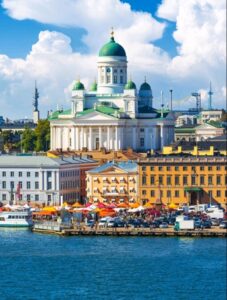Finland Maintains Lead as Happiest Country in the World for 8 Years Running
If happiness were a country, it would look a lot like Finland. For the eighth year in a row, the Nordic nation has been named the happiest country in the world, according to the World Happiness Report 2025.
But what exactly makes Finland and other top-ranking nations so happy?
Ask a Finn about their secret to happiness, and they might point to the breathtaking natural landscapes, the strong sense of community, or even the national obsession with saunas. But beyond the lifestyle perks, Finland’s top ranking is backed by real data. The country boasts a well-functioning social safety net, low corruption levels, and an outstanding work-life balance that gives people more time to enjoy life.
Other Nordic countries are right behind Finland in the rankings. Denmark, Iceland, Sweden, and the Netherlands complete the top five, proving that a strong social system, high trust in government, and policies that prioritize well-being create a recipe for national happiness.
This year’s report introduced some surprises, with Costa Rica and Mexico making their way into the top ten. Their rise highlights a different side of happiness—one rooted in community, culture, and resilience. Costa Rica, known for its stunning beaches and eco-friendly lifestyle, has long prioritized sustainability over GDP growth, proving that happiness isn’t just about money.
Meanwhile, Mexico’s strong family values, rich traditions, and deep sense of belonging have propelled it onto the list.
1. Finland
2. Denmark
3. Iceland
4. Sweden
5. Netherlands
6. Costa Rica
7. Norway
8. Israel
9. Luxembourg
10. Mexico
Happiness isn’t just about sunny beaches or a booming economy. The World Happiness Report measures happiness based on six key factors:
• Economic stability – A decent standard of living matters, but money alone doesn’t buy happiness.
• Social support – Knowing you have someone to rely on in times of trouble.
• Life expectancy – Living a long and healthy life.
• Freedom – Having the ability to make life choices without restrictions.
• Generosity – A culture of giving and helping others.
• Trust in government – Feeling secure in leadership and institutions.
These factors are based on global surveys where people rate their overall life satisfaction, combined with economic and social data from Gallup World Poll and other sources.
*More than Money*
Wealth helps, but it’s not the ultimate happiness factor. Countries that prioritize mental health, work-life balance, and community connections tend to rank higher.
*The Power of Community*
Costa Rica and Mexico prove that strong social ties and cultural identity play a huge role in well-being.
*Trust Matters*
Countries with low corruption and high trust in government consistently rank among the happiest.
*Work to Live Not Live to Work*
Many top-ranked countries have generous vacation policies, shorter workweeks, and a strong focus on leisure time.
The World Happiness Report 2025 reminds us that happiness isn’t a one-size-fits-all formula. While Nordic countries continue to lead with their strong social policies, other nations are proving that a sense of belonging, purpose, and balance can be just as important.
As the world faces new challenges, from climate change to economic uncertainty, countries may need to rethink their priorities putting well-being at the center of national policy.








